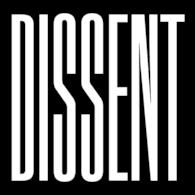Dissent (American magazine)
- For the Australian magazine, see Dissent (Australian magazine).
 | |
| Language | English |
|---|---|
| Edited by | Michael Kazin |
| Publication details | |
| Publisher |
University of Pennsylvania Press on behalf of the Foundation for the Study Independent Social Ideas, Inc. (United States) |
Publication history | 1954–present |
| Frequency | Quarterly |
| Indexing | |
| ISSN |
0012-3846 (print) 1946-0910 (web) |
| LCCN | 57002963 |
| OCLC no. | 664602786 |
| Links | |
Dissent is a left-wing intellectual magazine edited by Michael Kazin and founded in 1954. The magazine is published by the University of Pennsylvania Press on behalf of the Foundation for the Study of Independent Social Ideas. Former co-editors include Irving Howe, Mitchell Cohen, Michael Walzer, and David Marcus.
History
The journal was established in 1954 by a group of New York Intellectuals, which included Irving Howe, Lewis A. Coser, Henry Pachter, Norman Mailer, and Meyer Schapiro. From its inception, Dissent's politics deviated from the standard ideological positions of the left and right. Like politics, the New Left Review and the French socialist magazine Socialisme ou Barbarie, Dissent sought to formulate a third position between the liberalism of the West and the communism of the East.[1] Troubled by the rampant bureaucratization of both capitalist and communist society, Dissent was home to writers like C. Wright Mills and Paul Goodman who identified themselves as radical democrats as well as to editors who like Irving Howe and Michael Harrington more closely identified with democratic socialism. Over its six decades in publication, it has also become an influential venue for social and cultural criticism, publishing political philosophers including Michael Walzer, Cornel West, and Iris Marion Young, as well as novelists and poets such as Gunther Grass and Czeslaw Milosz.[2]
In the 1960s and 1970s, Dissent's skepticism toward Third World revolutions and the culture of the New Left occasionally isolated it from student movements. But its commitment to both pluralist and egalitarian politics—in particular, when it came to social and civil rights issues—separated it from both the mainstream liberalism and the growing neoconservative movement. Although Dissent still identifies with the democratic socialism of its founders, its editors and contributors represent a broad spectrum of Left positions: from the Marxist humanism of Marshall Berman and Leszek Kolakowski to the social democratic visions of Richard Rorty and Michael Walzer to the radical feminism of Ellen Willis and Seyla Benhabib.[3] More recently, several of its younger editors have identified themselves with the heterodox Marxism and visions of radical democracy espoused by Occupy Wall Street.[4][5][6]
Together with the Brooklyn Institute for Social Research, Dissent announced its Archive project. It will be digitizing several short-lived little magazines, including Marxist Perspectives and democracy, and providing access to them online.[7] It also recently launched a labor podcast and introduced a new front of the book section dedicated to publishing cultural criticism.[8][9]
In 2014, design studio Rumors finished a redesign of the journal.
References
- ↑ "A Word to Our Readers" (PDF). Dissent. Winter 1954.
- ↑ Maurice Isserman, If I Had a Hammer: The Death of the Old Left and the Birth of the New Left.
- ↑ Maurice Isserman, "Steady Work: Sixty Years of Dissent", Dissent, January 23, 2014.
- ↑ Michelle Goldberg, "A Generation of Intellectuals Shaped by 2008 Crash Rescues Marx From History’s Dustbin", Tablet, October 14, 2013.
- ↑ David Marcus, "The Horizontalists", Dissent, Fall 2012.
- ↑ Jennifer Schuessler, "A Lion of the Left Wing Celebrates Six Decades", The New York Times, October 27, 2013.
- ↑ "'Marxist Perspectives' Revived", Dissent blog, 18 April 2012, accessed 15 June 2014
- ↑ "Belabored Podcast to Launch Next Friday Featuring Karen Lewis", Dissent, April 5, 2013.
- ↑ Dissent website.
External links
- Official website
- Dissent at the University of Pennsylvania Press
- George Packer, "A Modest Utopia: Sixty Years of Dissent", New Yorker, October 21, 2013.
- Felicia R. Lee, "A Leftist Stalwart, Still Fighting the Fight", The New York Times, February 21, 2004. On Dissent′s 50th anniversary.
- Jennifer Schuessler, "A Lion of the Left Wing Celebrates Six Decades", The New York Times, October 27, 2013. On Dissent′s 60th anniversary.